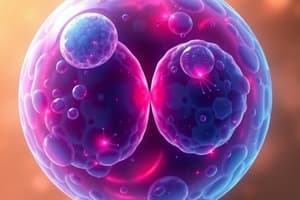Podcast
Questions and Answers
During which phase of mitosis do sister chromatids separate and move towards opposite poles of the cell?
During which phase of mitosis do sister chromatids separate and move towards opposite poles of the cell?
- Telophase
- Prophase
- Anaphase (correct)
- Metaphase
Which of the following events is NOT a characteristic of prophase?
Which of the following events is NOT a characteristic of prophase?
- Alignment of chromosomes at the equator of the cell (correct)
- Condensation of chromatin into visible chromosomes
- Breakdown of the nuclear envelope
- Beginning of spindle fiber formation
What is the primary function of mitosis in multicellular organisms?
What is the primary function of mitosis in multicellular organisms?
- Growth and repair of tissues (correct)
- Production of gametes for sexual reproduction
- Reduction of chromosome number by half
- Ensuring genetic diversity among offspring
In plant cells, how does cytokinesis differ from cytokinesis in animal cells?
In plant cells, how does cytokinesis differ from cytokinesis in animal cells?
Which of the following best describes the role of spindle fibers during mitosis?
Which of the following best describes the role of spindle fibers during mitosis?
What is the significance of interphase in the cell cycle?
What is the significance of interphase in the cell cycle?
What is the primary difference between mitosis in animal and plant cells regarding centrioles?
What is the primary difference between mitosis in animal and plant cells regarding centrioles?
What is the result of a single mitotic division of a cell?
What is the result of a single mitotic division of a cell?
Flashcards
Mitosis
Mitosis
Cell division that produces two genetically identical daughter cells.
Prophase
Prophase
The stage of mitosis where chromatin condenses into visible chromosomes, the nuclear envelope breaks down, spindle fibers form, and centrioles move to opposite poles (in animal cells).
Metaphase
Metaphase
The stage where chromosomes align at the center of the cell, attached to spindle fibers.
Anaphase
Anaphase
Signup and view all the flashcards
Telophase
Telophase
Signup and view all the flashcards
Cytokinesis
Cytokinesis
Signup and view all the flashcards
Interphase
Interphase
Signup and view all the flashcards
Cellular control of mitosis
Cellular control of mitosis
Signup and view all the flashcards
Study Notes
Overview of Mitosis
- Mitosis is a type of cell division that results in two genetically identical daughter cells.
- It is essential for growth, repair, and asexual reproduction in organisms.
- Mitosis is a continuous process, but it is often described in phases for easier understanding.
Phases of Mitosis
-
Prophase:
- Chromatin condenses into visible chromosomes.
- The nuclear envelope breaks down.
- Spindle fibers begin to form.
- Centrioles (in animal cells) move to opposite poles of the cell.
-
Metaphase:
- Chromosomes align along the equator (middle) of the cell.
- Spindle fibers attach to the centromeres of each chromosome.
-
Anaphase:
- Sister chromatids separate and move towards opposite poles of the cell.
- Spindle fibers shorten.
-
Telophase:
- Chromosomes reach opposite poles and begin to decondense.
- Nuclear envelopes reform around each set of chromosomes.
- Spindle fibers break down.
- Cytokinesis begins.
Cytokinesis
- Cytokinesis is the division of the cytoplasm to form two separate daughter cells.
- In animal cells, a cleavage furrow forms and pinches the cell in two.
- In plant cells, a cell plate forms between the two nuclei, eventually developing into a new cell wall.
Importance of Mitosis
- Growth: Mitosis allows organisms to grow by increasing the number of cells.
- Repair: Damaged tissues can be repaired through mitosis, replacing dead or injured cells.
- Asexual Reproduction: Some organisms reproduce asexually through mitosis, creating genetically identical offspring.
Cellular Control of Mitosis
- A cell's control over mitosis is crucial to prevent uncontrolled cell growth, which can lead to cancer.
- Various checkpoints ensure that each step of mitosis is completed correctly and that the cell is ready to divide.
Interphase
- Interphase is the period of cell growth and development that precedes mitosis.
- It is not a part of mitosis but a crucial part of the cell cycle.
- During interphase, the cell grows, replicates its DNA (chromosomes), and carries out its normal cellular functions.
Difference between Mitosis in Animal and Plant Cells
- Animal cells have centrioles which initiate the formation of the spindle apparatus, unlike plant cells.
- Plant cells have a rigid cell wall, requiring the formation of a cell plate to divide the cytoplasm during cytokinesis, not a cleavage furrow as in animal cells.
Key Terms
- Chromosome: A condensed structure of DNA containing genetic information.
- Chromatid: One half of a duplicated chromosome.
- Centromere: The region where two sister chromatids are joined.
- Spindle Fibers: Protein structures that help separate chromosomes during mitosis.
Studying That Suits You
Use AI to generate personalized quizzes and flashcards to suit your learning preferences.




